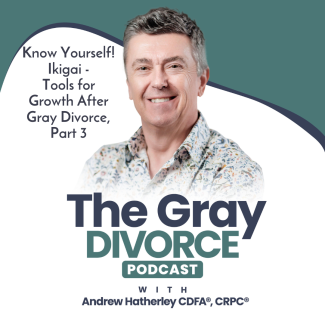
The Gray Divorce Podcast: Episode 29 Know Yourself! Ikigai - Tools for Growth After Gray Divorce, Part 3
Announcement: Welcome to The Gray Divorce Podcast, hosted by Divorce Financial Analyst and Retirement Planning Counselor, Andrew Hatherley. Join Andrew and guest experts as they help late life divorcees build the financial and mental foundation for a meaningful future. There is life after divorce. Now onto the show.
Andrew Hatherley:
Hello everybody, welcome to Episode 29 of the Gray Divorce podcast. Today we continue our discussion on the importance of better understanding ourselves before, during and after mid to late life divorce.
This episode is Part 3 of our discussions based around important tools of positive psychology, that branch of psychology focused on the character strengths and behaviors that allow individuals to build a life of meaning and purpose—to move beyond surviving to flourishing.
You've heard me say many times on this podcast that there is life after divorce. And it can be a period of great growth and personal enrichment as we emerge from a situation that wasn't right for us. It's an opportunity for us to start over, to hit the reset button and yes, of course, rebuild.
In my work as a certified divorce financial analyst and chartered retirement planning counselor, I work with people on the financial aspect of rebuilding or protecting their financial foundation to lead a more contented life after divorce.
But I know, having gone through gray divorce myself, that mindset is such an important part of the equation to living a more contented life. And a big part of my mindset shift after my divorce came with being open to learning more about myself and understanding aspects of my own personality. This required an appreciation of the truth and accepting some things about myself that maybe I hadn’t recognized or didn’t want to recognize.
This is where the tools of positive psychology can be so helpful.
In parts one and two, episodes 21 and 22, I talked about the notion that we don't really know ourselves as well as we think we do and that plenty of scientific research bears this out. I also discussed why it matters that we develop a better understanding of ourselves and how tools of positive psychology like the Big Five Personality Test and, the VIA Survey of Character Strengths and Virtues, can be used to help us live a more authentic, meaningful, purposeful life, and maybe become a better person in the process.
This episode will deal with one of the most fundamental human needs, finding purpose in life.
In Japanese culture, to find meaning and purpose in life is known as finding your ikigai. The term combines 2 words: “iki” which means life and “gai” which means worth. Some psychologists have understood the meaning to be “the realization of what one hopes for” or “reason for being”. A book has been written on the subject by Hector Garcia and Francesc Miralles. The book is called “Ikigai: The Japanese secret to a long and happy life.” Garcia and Miralles roughly translate Ikigai as “the happiness of always being busy.” For them, Ikigai goes beyond a person's pursuit of the meaning of life.
A person's ikigai can be a passion, a goal, a mission. It’s something that infuses each day with meaning, gives us a reason to get up every morning. Discovering your ikigai may require patience, commitment, and a lot of introspection. For some people it may be easy to figure out what their ikigai is, for others it may be a lifelong search.
To help find your personal ikigai it's important to consider that there are four key components to the concept of ikigai.
These are:
1. What you love
2. What you’re good at
3. What you can get paid for
and
4. What the world needs.
So, to discover your Ikigai you must first identify these four components.
Ikigai is then found at the point where these four elements converge.
Ikigai is best illustrated by four overlapping circles, like a Venn diagram. If you're having trouble picturing this in your mind, just Google ikigai, you'll see lots of images of what the circles look like. In the show notes, I provide a couple links to more information on ikigai.
Try this exercise: draw four overlapping circles. There will be a top circle, a bottom circle, a left circle and a right circle and they'll all cross each other in the middle.
Above the top circle write the three words “what I love.” Take a few minutes to think about the things you love in any aspect of your life. This could be work, hobbies, personal interests. Some examples might be travel, teaching, guitar, writing, golf. Write these things inside at the top of the circle.
Next, just underneath the bottom circle right the heading “What can I be paid for”. Here you might write down, just inside the circle, bookkeeping, photography, writing, teaching.
Do the same with the left circle for “What I'm good at.” For example, this might include photography, writing, helping others, organizational skills, teaching others, listening, bookkeeping.
Finally on the right circle consider “What the world needs”. In our example, let’s consider compassion, freedom, sense of community, access to healthcare, access to a good education, friendship, a sense of community.
Of course, what you put in these various circles is going to reflect your particular interests and worldview. Don't be surprised if it takes you longer than you might have imagined to think of things you love, things you're good at, what you can get paid for and what the world needs.
It might help to consider some prompts. For instance, for “what do you love” consider the times you feel happy, or what were you doing when you lost track of time; something some people call a “flow” state. What are the things that energize you as opposed to sapping your strength. What did you love to do as a child?
When considering “what you're good at”, think about the skills you spend time practicing, any awards you have won. When people come to you for help, what sort of help are they looking for?
In answering the question “what can you get paid for” well… consider what you've been paid for before, or what you might be doing if you weren't in your current job. Consider which jobs or tasks interest you. You should also consider whether you're making a good living in your line of work.
Regarding the question of “what does the world need”, you might think about what changes you would like to bring about in the world or what you could offer that would help others, or something that you see that people need in society.
Once you've listed some topics inside these circles, look to see where there may be similar responses in overlapping circles.
For instance, the things that you love and are also good at could be your passion. These two activities might give you a feeling of satisfaction, but you might also be left with the feeling that maybe you're not contributing as much to the world as you could. And if you're not getting any sort of financial reward for this activity, it’s probably not sustainable in the long term.
If any item listed in “what you love” appears also in “what the world needs” well then you have found a mission. This can give you a sense of fulfillment, knowing that you're making a difference in the world, but you may still be faced with the issue of whether you can earn a living from it. And, will you get the satisfaction of doing the task well?
Consider the circles that list “what you can be paid for” and “what the world needs”. Any item listed in both circles can be considered to be your vocation. These activities can provide you an income and they can also have a positive impact on the world. But if you're not really very good at these activities and you don't love them, you may end up feeling empty and anxious.
Now consider the circles which contain activities that “you're good at” and activities that “you can be paid for.” Here you have found your profession. Many of us in the working world find ourselves spending our time in an activity found at the intersection of these two circles. We're comfortable because we're making a good living doing something that we're good at, but we may not be passionate about the activity because we don’t really love it. We may also wonder sometimes if we're making much of a positive impact on the world.
By now you've probably figured out that if some activity that you’ve listed appears in all four circles well, then, you’ve found your Ikigai. When any response appears in what you love, what you're good at, what you can be paid for, and what the world needs you’ve found your Ikigai.
Remember the activities we discussed when we were filling out a hypothetical Ikigai a few minutes ago? In that example, teaching was the activity that appeared in all four circles.
But that’s simply one example. Your ikigai might be building houses, practicing medicine, fixing cars. Any activity that finds itself at the intersection of the four components we’ve discussed.
Some people are really fortunate in that they're able to determine their purpose or Ikigai quite quickly.
It's very likely that you may not have this one magical activity at the center of these four circles. You shouldn’t despair. Finding Ikigai may require some work on your part, and it may not happen overnight. I’m not sure I’ve quite found my ikigai yet. But I’m sure I’ve made progress!
Your purpose may become clearer over time as you grow, gather experiences, or go through a major life transition such as divorce or widowhood. It may also require some of the other tools of positive psychology we've discussed, like the Big Five Personality Assessment and the VIA Strengths Finder, to help you honestly assess your passions, your aptitudes, and strengths.
You may even find that you can identify more than one ikigai or that your ikigai may change as the circumstances of your life change.
Of course, life is a journey. And the more self-aware we can be about the experiences we have on our life's journey, the more likely we are to find our ikigai or purpose.
I hope so anyway!
Garcia and Miralles, in their book on Ikigai, identify a few operating principles to living a long and happy life. We discussed some of these before on the podcast. They include:
Staying active and maybe not even retiring.
Surrounding yourself with friends and family. The famous Harvard study of adult development has shown that good relationships in your life are linked to happiness and longevity.
Exercise of course is a huge component contributing to longevity.
Spending time in nature has been shown to boost productivity, enhance your mood and improve memory.
Living in the moment is another attribute of people living long and happy lives. Not to regret the past or either fear the future or overly fixate on the future but to enjoy the moment.
Finally, this podcast is being recorded a few days before Thanksgiving, so I'd add that giving thanks and being grateful, reminding ourselves of the good things in our lives, is a key component to a long and happy life.
With that, I'd like to thank you for listening and supporting The Gray Divorce Podcast and I hope you all have a great holiday season
Until next time, bye for now.
Announcement: Thanks so much for tuning into this episode of The Gray Divorce Podcast. To learn more or get in contact with your host, you can visit Andrew's website at transcendretirement.net. Also, please feel free to rate, subscribe, and leave a review wherever you listen to your podcasts.
That helps others find the show, and we greatly appreciate it. Thanks again for listening, and we'll catch you in the next episode.
Andrew Hatherley: Information provided is educational only and should not be construed as legal or tax advice. Each situation is unique and should be discussed with your tax or legal advisor prior to implementation. Andrew Hatherley is not an attorney and does not provide legal advice. Information provided is financial in nature.
Advisory services offered through Hatherley Capital Management LLC. Divorce Financial Analysis Services offered through Wiser Divorce Solutions, an affiliated company.

